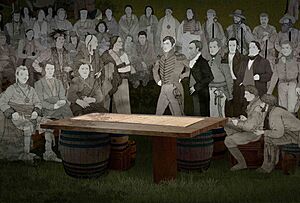Treaty of Spring Wells facts for kids
The Treaty of Spring Wells was an important agreement signed in 1815. It was made between the United States government and several Native American groups. These groups included the Wyandot, Delaware, Seneca, Shawnee, Miami, Chippewa, Ottawa, and Potawatomi peoples.
This treaty officially ended a conflict between the U.S. and these Native American nations. This conflict was part of the larger War of 1812. The treaty was signed on September 8, 1815. The signing took place near what is now the Fort Wayne historical site in Detroit, Michigan.
Contents
Why the Treaty Was Needed
The main goal of the Treaty of Spring Wells was to bring peace. During the War of 1812, some Native American groups had supported Great Britain. The United States wanted to forgive them for this support. They also wanted to make sure these groups would be loyal to the U.S. in the future.
Ending Hostilities and Restoring Rights
The treaty officially stopped all fighting between the U.S. and the Native American nations. It also confirmed an older agreement from 1795, called the Treaty of Greenville. It also confirmed all other treaties they had signed since then.
The U.S. government agreed to give back all the lands, rights, and special treatment the Native Americans had in 1811. In return, the Native American groups agreed to be protected only by the U.S. government. They also promised to end any connections with Great Britain.
Forgiving Past Actions
The United States also agreed to pardon, or forgive, any chiefs and warriors. This included those who had continued fighting against the U.S. until the War of 1812 ended. This showed a willingness to move past the conflict.
Who Signed the Treaty
Important people from both sides were involved in signing the treaty.
U.S. Negotiators
The United States was represented by three treaty commissioners. These were:
- William Henry Harrison
- Duncan McArthur
- John Graham
Native American Leaders
Several Native American leaders signed the treaty on behalf of their people. Some of these leaders included:
- Tarhe (from the Wyandot people)
- Pacanne (from the Miami people)
- Black Hoof (from the Shawnee people)
 | Sharif Bey |
 | Hale Woodruff |
 | Richmond Barthé |
 | Purvis Young |


